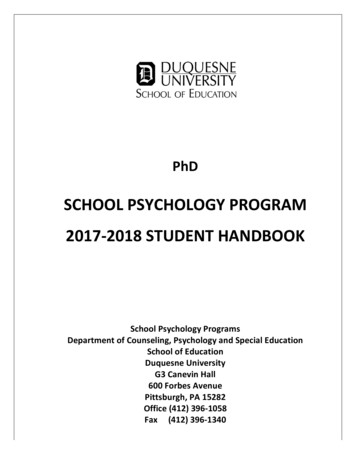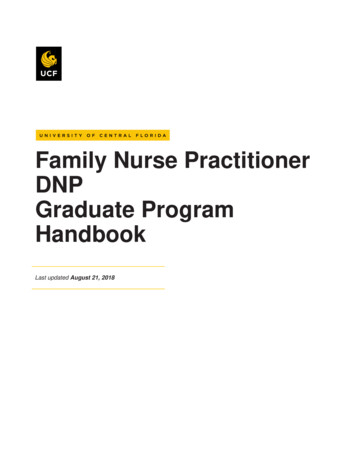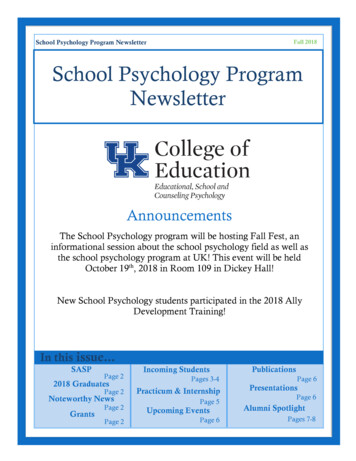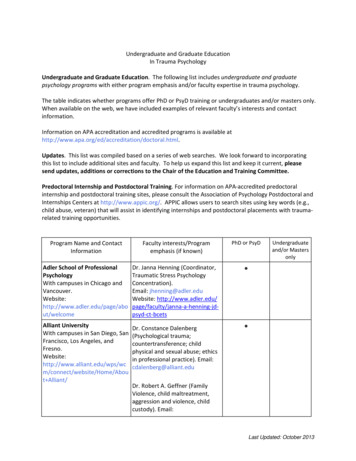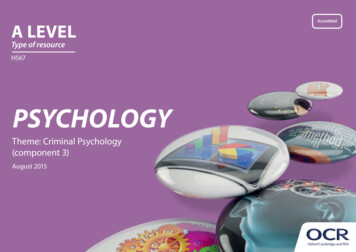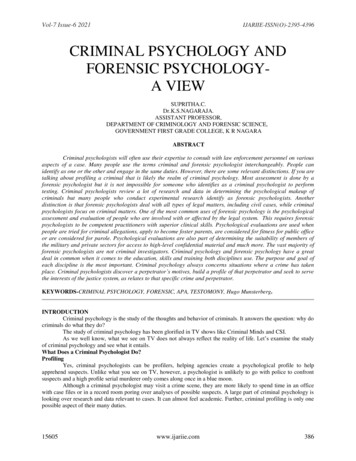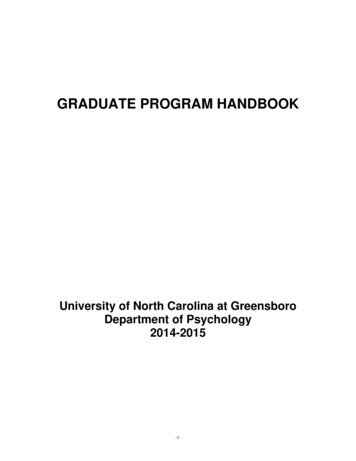
Transcription
GRADUATE PROGRAM HANDBOOKUniversity of North Carolina at GreensboroDepartment of Psychology2014-2015-1-
undergraduate program, such as suggestions aboutundergraduate teaching, should be directed to the DUGS. Inorder to benefit from the information in this Handbook, youmust be prepared to take responsibility on your own for yourprogress in the program. Do not assume that your advisor orother faculty members will automatically remind you aboutevery step that you need to take. We urge you to meet withyour advisor regularly to review your progress, to respondpromptly to requests for information and to suggestions foraction, and to use the channels for communication betweengraduate students and faculty that are described elsewhere inthe Handbook. For any of the rules, regulations, andrequirements described in this Handbook, appeals orrequests of exemptions or alternatives should be made to theDirector of Graduate Studies.INTRODUCTIONWe welcome you to the Psychology Department and wish yousuccess in your graduate career. The following faculty andstaff are important contact persons: Director of GraduateStudies (DGS; Dayna Touron, d touron@uncg.edu); Directorof Clinical Training (DCT; Susan Keane, 336-256-0569,spkeane@uncg.edu); Director of Undergraduate Studies(DUGS; Peter Delaney, (336)-256-0010,p delane@uncg.edu) and Graduate Program AdministrativeAssistant for Psychology (Mindy Wolf, 336-334-5014,mjwolffo@uncg.edu).This Handbook has been prepared by the PsychologyDepartment as both a source of information aboutrequirements and expectations of the graduate program andof suggestions that may help you gain the most from yourassociation with the Department. A new edition of theHandbook is uploaded to the departmental website eachyear. You will be kept informed throughout the year of majorchanges in its contents. Students can satisfy their academicrequirements by satisfying the requirements of any edition ofthe Handbook that has been published during their tenure inour program. It is the responsibility of the Director of GraduateStudies (DGS) to keep the Handbook up to date; if you haveany suggestions for its improvement, please contact thatperson.The information in the Handbook reflects the department’sofficial requirements. Supplements to this document areprovided in three other publications of the University: TheGraduate School Bulletin( http://grs.uncg.edu/bulletin/), , theStudent Affairs Policy Handbook(http://sa.uncg.edu/handbook/), student grievance procedures(http://sa.uncg.edu/grievance/). University policies related tograduate students n/University-Policies) and The Graduate SchoolGuide to the Preparation of Thesis and Dissertations. Youshould refer to the most recent editions of these publicationsfor details not given here. Other documents that provideadditional information are referred to as appropriatethroughout the Handbook.Except for service requirements for assistantships whichspecify maximum workloads, the requirements andexpectations described here are the minima that the faculty,as a whole, has agreed to be appropriate to a Master of Artsand Ph.D. granting department such as ours. The PsychologyDepartment also has more stringent criteria (e.g., requiredcourse grades for degree requirements) than does theGraduate School. Individual faculty also may wish to imposemore stringent requirements on the students who work withthem, or on whose committees they serve. Furthermore, youmay be required by your advisor or advisory committee toperform work over and above the minimum because of yourspecific research plans or because you lack appropriatebackground in some areas. All such issues are matters fordiscussion and negotiation between you and your advisor.Overall, any changes to requirements must be approved bythe Director of Graduate Studies (DGS) and your committeebefore the Graduate School will accept them.New graduate students are encouraged to read thishandbook in its entirety and to consult with their advisor or theDGS if any of the requirements described in it are unclear.Questions about the clinical program should be taken to theDirector of Clinical Training (DCT). Questions about theoperation of the Psychology Clinic should be referred to theDirector of the Psychology Clinic. Questions about the-2-
The Council of University Directors of Clinical Training(www.cudcp.us) has adopted the following guidelines foroffers into doctoral clinical psychology programs. If you areapplying to a CUDCP program, you should expect that thefollowing policies will apply:Admission to the Doctoral Program inClinical Psychology:1. In most CUDCP programs, a subset of applicants will beinvited for an interview. Within a few weeks of the finalinterview dates, applicants will be notified regarding the statusof their application. You may be offered admission, declinedadmission, placed on a wait list, or in some cases, informedthat a decision has not yet been reached regarding yourapplication.1.Academic Preparation and admissions requirementsMinimum standards for graduate admission to theClinical Program in the Department of Psychology are:a. A BA/BS in Psychology or BA/BS degree in another fieldand minimum of 5 Psychology courses (including IntroductoryPsychology, Abnormal Psychology, Research Methods, andStatistics) and the Advanced GRE.b. A minimum overall undergraduate GPA of 3.0c. A minimum Psychology GPA of 3.2d. Verbal and Quantitative scores on the GRE at or above theth40 percentilee. Non-native English speakers must earn TOEFL scoresabove Graduate School minima (currently, 79 for internetbased test and 550 for paper-based test)f. Students applying with an MA must have a GPA of 3.3 orhigher.As indicated in our student outcome tables on the Departmentwebpage, competitive candidates in Clinical Psychology havecredentials exceeding the departmental minimum standards.2. Training programs will notify students no longer beingconsidered for admission as soon as possible. In somecases, this information is communicated by the universitygraduate school and can take several weeks to be processed.In some cases, you may be able to get updated informationon the status of the application process (e.g., whether allinterview invites have been extended; whether all offers havebeen extended), on a clinical program's website, or bycontacting a program administrator. Beware of informationposted on student - focused online forums that may beinaccurate or incomplete.3. A student can expect to receive offers of admission toprograms over a considerable period of time. The timing ofoffers to students largely is determined by the University’sreview schedule, which is a strictly internal matter.Regardless of when the offer is made, students are notrequired to respond to the offer before the decision date ofApril 15 (by 11:59pm Eastern, or by this time on the firstMonday after April 15, if April 15 falls on a weekend),except as specified in Section 6 belowa. Offers usually are made in writing prior to April 1st.Between April 1st and the decision date, universities maychoose to facilitate the process by making offers to studentsover the phone or by email when a position comes up. Theseoffers are official, but are typically followed up by writtenconfirmation from the Psychology Department.b. Offers, once made, cannot be withdrawn by theuniversity until after the decision date and then can bewithdrawn only if the student fails to respond to the offer bythe decision date.c. A program may make an offer after the April 15thdecision date if it still has one or more open slots. Offersmade after the decision date should clearly state how long thestudent has to decide on the offer. The student should begiven sufficient time (at least a week) to visit a programbefore making a decision.2. Admissions Process: For the Clinical Program,applications are considered only once per year (duringJanuary and February) for admission in the following fall term.Application deadline: December 15th.An admissions committee consisting of at least 2 clinicalfaculty members reviews applicants to the clinical program.We are seeking applicants who are bright, well prepared,motivated, socially skilled, and whose interests arecompatible with our model of training. Successful applicantstypically hold undergraduate degrees in Psychology and haveexcellent grades and GRE scores (Verbal, Quantitative andWriting), outstanding letters of recommendations from facultywho know them well, a true interest in being trained as ascientist –practitioner, career goals that are consistent withscientist-practitioner training, a clearly articulated researchstatement, and a good fit with a faculty member’s program ofresearch.For students holding a BA/BS degree, relevant postbaccalaureate experiences are typically viewed verypositively in our decision-making process. We also considerstudents who have earned a Clinical or Research MA degreein psychology from another institution. The above standardsapply.4. Offers with funding are treated like any other offer. Thereshould be no stipulation by the University that the offercarries funding only if the student accepts by a specific datethat precedes the decision date described above.The top 30-35 applicants each year are invited to campus forinterviews, and offers of admission are typically extended to8-15 students. We seek an incoming class of approximately 6students.5. A student should not hold more than two offers for morethan one week unless there is specific information (e.g. a visitis scheduled, funding decisions, advisor decisions) they arewaiting to receive from the program. Difficulty making upone’s mind is not considered an adequate excuse to limit theoptions available to other applicants. Holding multiple offersties up slots, preventing programs from making offers to otherstudents. This is a complex principle operationalized in thepoints below.a. It is legitimate for students to want to visit a program, ifthey have not done so already, before making decisionsamong offers. Such visits should be scheduled as soon aspractical after the offer of admission is received. If after a visit3. Admissions OffersThe clinical program follows and endorses the CUDCPguidelines for Graduate Admissions and acceptances policyas stated rs%20policy Revised2013.pdfSummary of CUDCP Policy for Graduate School Offersand Acceptances (FULL DOCUMENT IN APPENDIX I)Information for Applicants-3-
to a program the student decides that the program is ratedlower than a program that the student has already beenoffered admission to, the student should inform the lower rankprogram that they will be declining their offer.b. Whenever possible, the student applicant should informtraining programs by phone or email of a decision, followingup within 24 hours with a written confirmation of that decision.c. Once a student has accepted an offer of admission to aGraduate Training Program, the student should inform allprograms in which they are currently under consideration thatthey are either declining outstanding offers of admission or nolonger wish to be considered for admission. Students shouldcontact by phone or email those programs that have offeredthem admission.residence at least one year before formal admittance to thePh.D. program.It should be noted that, regardless of previous experiences, toobtain a PhD degree from UNCG we require students to beenrolled in our program for a minimum of three years.Professionals in the Greensboro area wishing to continuetheir education and pursue a Ph.D. are welcome to apply, butthey will be evaluated according to the same rigorousstandards as other applicants and must be prepared to dofull-time training. Except in extraordinary circumstances, wedo not offer clinical retraining of persons with a Ph.D. inanother area of psychology. Qualified persons may takespecific graduate courses in the department (e.g.,Psychological Disorders of Adults or of Children; courses innon-clinical areas of psychology) without admission to theprogram. Interested students should contact the GraduateSchool for admission as a non-degree student. Theassessment, intervention and practicum courses are openonly to clinical psychology graduate students.6. The current policy statement of the Council of GraduateDepartments of Psychology allows students to resign offersthey previously accepted up to the April 15th decision date bysubmitting the resignation in writing (preferably by emailimmediately followed up by a letter). The purpose of thispolicy is to avoid pressure on students to accept offers beforethey have heard from other schools. Although withdrawing anacceptance is legitimate, it is not good form and is verystrongly discouraged. A much better approach is to accept aposition only if you intend to follow through on yourcommitment. Students have the right to holdoffers as described above if a preferable offer is stillpossible. Except in very unusual situations (e.g., seriousillness or major personal problems), a student who acceptsan offer of admission is expected to start the graduateprogram the following fall.Upon request, programs may grant a deferral but they are notobligated to do so. Training lines are severely limited, andfailing to use a line once it has been offered prevents otherqualified students from obtaining training.COMMUNICATIONIn order to stay abreast of information about colloquia,awards, funding opportunities and deadlines and otherimportant news from the program and department, as well asto respond in a timely manner to requests for information fromthe Head, DGS, or DCT, students are required to obtain aUNCG email account and to check that account frequently- atleast on a daily basis. Emails from the Department Head areoften sent out by Melinda Wolf or Melanie Carter. SherryCornett often sends communication from the DGS or theGraduate School. The DCT sends many emails concerningcongratulatory notices and program news and events. Ofcourse, important emails may also be sent directly from theindividual who needs to convey important information orneeds our assistance. Please pay special attention to theseemails and respond accordingly.Post- Admission:Once an offer of admission is made and accepted, thestudent will receive information from the Graduate Schoolabout preparing for matriculation in the Fall semester.GRADUATE CURRICULUMFor a student holding an MA degree from another institution,we review coursework, practicum experience and researchexperiences and determine what, if any, additional master’slevel coursework is needed at UNCG. The DCT, the advisor,and the relevant course instructor review past coursework.Typically, a student earns credit for approximately 1 year ofpast coursework toward their degree from UNCG. However,this is not an automatic year of credit, and is based on carefulreview of the comparability of courses taken elsewhere. Acommittee of two faculty reviews the student’s thesis, againdetermining the comparability of this project with UNCGstandards. If the committee deems the thesis comparable, thestudent does not need to complete this program requirement.For students whose thesis at another institution has beenapproved for transfer, the student will also receive 6 transfercredit hours corresponding to PSY 699. Practicumexperiences are reviewed by at least 2 faculty members in asimilar manner. It is not unusual for a student to earn creditfor one year of past practicum training toward their UNCGrequirements, although again, this decision is dependent onthe outcome of the practicum review. Students should speakwith the DCT and their advisor about the process of obtainingMA licensure in NC, which will facilitate their AdvancedPracticum training. See pp .17-18 for more details.The Psychology Department offers two graduate trainingtracks and students may apply to either or both tracks. Onetrack (the Terminal MA program) leads to a terminal Master’sof Arts in General Experimental Psychology. The other track(the MA-PhD program) leads to a Ph.D. with specialization inclinical, cognitive, developmental or social psychology.Students admitted into either track must complete all of therequirements of their Master’s of Arts degree with the samedegree requirements that are specified below. Studentsadmitted into the terminal Master’s of Arts degree track mayapply to the MA-PhD track in anticipation of meeting all of therequirements of the terminal Masters of Arts degree.MA-PhD students begin as Master’s degree students and areconsidered for admission to the PhD program as soon as allrequirements for the Master’s degree at UNCG have beenmet. For students entering with a Master’s degree fromanother university, a minimum of 2 semesters of UNCGcoursework is required before formal admission to the PhDProgram is granted. Credit hour and course requirements forthe Master’s and PhD are listed in The Graduate SchoolBulletin and are discussed in detail in this handbook.Note that the clinical program does not offer a terminal MAprogram. When referring to a Master’s of Arts (MA) in ClinicalPsychology, the handbook is referring to obtaining a Master’sdegree as part of the MA-PhD track in Clinical Psychology.For students holding a MA degree in an area outside ofClinical Psychology, we review coursework and researchproducts in the same manner. All students must be in-4-
Only students originally admitted into the clinical psychologyMA-PhD track may engage in clinical activities.Students are expected to demonstrate competence inresearch and have the skills and professional standards toapply the knowledge of the discipline competently andethically in their daily lives and careers. Students specializingin clinical psychology may engage in applied research andlearn how to effectively apply the methods and principles ofpsychology to the treatment of clients having psychologicaldisorders, or their program of research may be less applied innature. All research is expected ot be of high quality andstudent will be assessed oh their competence in developingand carrying out their research. Students specializing incognitive, developmental or social psychology engage inbasic and/or applied research but not in clinical activities.Areas of SpecializationThe Department has identified four main areas of graduatetraining to which it will commit the majority of its resourcesand recruitment efforts: Developmental, Cognitive, Social,and Clinical. The Clinical Program is accredited by theCommission on Accreditation of the American PsychologicalAssociation. This standing reflects: (a) that training in clinicalpsychology received at UNCG is compatible with other APAapproved programs both in terms of training models andcurriculum; and (b) that the institutional setting, faculty (bothclinical and non-clinical), and facilities are adequate to meetand support the student’s academic needs. In terms of astudent’s career development, graduation from an APAapproved clinical program is often a prerequisite for certainpre-doctoral internship placements and/or job opportunities.This credential also eases the licensure process and entryinto some professional organization. This next site visit isscheduled for Fall 2014. Questions related to the program’saccredited status should be directed to the Commission onAccreditation: Office of Program Consultation andAccreditation, American Psychological Association, 750 FirstStreet, N.E., Washington, DC 20002-4242, telephone 202336-5979, email apaaccred@apa.org, webwww.apa.org/ed/accreditationSpecific Course Requirements for the Master of ArtsDegree for theTerminal MA in General ExperimentalPsychology and MA-PhD Experimental StudentsStudents who do not earn a GPA of 3.0 or higher incoursework are not in good standing and cannot earn aMasters degree. Terminal MA students must earn a B (not aB-) in each of the 3 core courses. MA-PhD Experimentalstudents must earn a B (not a B-) in all courses.Required: 36 hours total.A. Core Courses for Terminal MA (9 hours)You must take at least one core course from three of the fivecore areas of Biological, Clinical (Adult and Child Disorders),Cognitive, Developmental, and Social Psychology.Details of faculty interests can be found on the PsychologyDepartment website. Students are encouraged to becomefamiliar with research being carried on throughout theDepartment and are expected to attend colloquia, lectureseries, and lab meetings, and to participate in researchopportunities. The details of lab meetings and researchopportunities can be obtained by contacting individual facultymembers. The faculty recognize that your research interestsmay change as you progress through the program andencourage you to develop those interests throughconsultation with your advisor and contact with appropriatelab and research groups. If you are contemplating a changein research focus, your first conversation should be with yourcurrent advisor, who will be in the best position to help younavigate this change. Admission into a particular area ofspecialization, therefore, does not constitute a commitment toremain in that area throughout your graduate career. Anexception to this general statement concerns the clinical area:Students initially admitted into one of the experimental(cognitive, developmental, social) areas cannot transfer intothe clinical program without re-applying, and students initiallyadmitted into the clinical area or any other area, must apply tothe Department for permission to transfer into another area.Biological:PSY 650 – Physiology of Sensory and BehavioralProcesses (3)Clinical:PSY 661 – Psychological Disorders in Children (3)PSY 662 – Psychological Disorders in Adults (3)Cognitive:PSY 652 – Cognitive Processes (3)Developmental:PSY 643 – Developmental Psychology (3)Social:PSY 647 - Advanced Social Psychology (3)B. Statistics and Methodology for Terminal MA (11 hrs)Statistics:PSY 609 & 610 – Advanced Statistics I, II (4) (4)Typically, your area of specialization is defined by youradvisor's area affiliation and by the nature of your thesis ordissertation research. In addition to these areas of researchspecialization, the Department recognizes other divisions ofthe field of psychology for purposes of core courses,advanced seminar offerings, and preliminary examinations.Details are given below. For example, most clinical studentsconduct research on clinical problems and so their advisor willusually be a member of the clinical faculty (although this isnot required).Research Methods:PSY 624 – Research Methods (3)C. Additional course requirements for Terminal MA (10 hrs)Typically courses are to be selected from 600 or 700 levelpsychology courses. Graduate level courses in otherdepartments also can be selected. However, only one 500level course inside or outside the Department can be takenfor credit towards the Masters or Ph.D., unless approved bythe DGS. Further, a student can only take a maximum of 6credit hours of independent study (PSY 601) for credit towardthe Masters degree.Goals for All Graduate ProgramsThe goal of the Terminal MA degree track as well as the MAPhD track is to develop competence in the core areas ofpsychology as well as in the methods of the discipline.D. Research and Thesis for Terminal MA (6 hrs)PSY 699 – Thesis (6)-5-
Dissertation – 6 creditsExample Schedule for the Masters Degree for Terminal MAand MA-PhD Experimental StudentsNote that this plan earns 72 credits, one credit above therequired minimum.First year (20 credits)3 core courses – 9 credits2 statistics courses (w/Lab) (PSY 609-610) – 8 credits1 methods course (PSY 624) – 3 credits* To maintain an assistantship, you must take at least 6credits per semester. Therefore, to maintain an assistantshipfor the entire fifth year, you could take 12 credit hours ofdissertation in the fifth year. Note that although you can takeup 24 hours of dissertation credits, only 12 count toward the71 hour requirement.Second Year (16 credits)4 Courses - 10-12 credits(Note: 1 of these 4 may be a 1-credit PSY 601)Thesis – 6 creditsSpecific Course and Credit-Hour Requirements for MAPhD in Clinical PsychologyThere is no terminal MA program or degree in clinicalpsychology; however, clinical students in the MA-PhD trackmust satisfy all requirements for the Master’s of Arts degreein clinical psychology as part of their PhD requirements. Aminimum of 57 hours is required for the MA component. ThePhD in Clinical Psychology requires 112 semester hoursincluding internship hours (6 credits). All credits taken tosatisfy the MA component may be applied toward the PhDrequirements.Credit Hour Requirements for PhD Degree forExperimental StudentsThe Ph.D. requires 71 credit hours; you must satisfy therequirements of the Master of Arts degree and all creditsearned as requirements for the Masters degree may beapplied towards the Ph.D.If a Terminal Masters student is admitted to the PhD program,then any grades of B- or lower earned during the MA cannotcount toward the PhD degree; these courses must be retaken, or substitute courses taken, with B grades or better tocount towards the PhD degree.For clinical program students, course grades of B- or lowercannot count toward either the MA or PhD degree. Gradeslower than a B will trigger a remediation plan which willindicate how the student can demonstrate competency.These courses must be re-taken, or substitute courses taken(e.g. PSY 601), with B (or S) grades or better to counttowards the MA or PhD degree. The Course equivalents aredecided in consultation with the advisor, the student’splanning committee, and the Director of Clinical Training.You must take a minimum of 24 hours of research, including6 hours of PSY 699 (MA Thesis), 6 hours of PSY 751(Independent Doctoral Research), and 12 hours of PSY 799(Dissertation). In addition to the 24 hours of research, youmust complete an additional 47 hours to include 18 to 30hours in your area of specialization (cognitive, developmentalor social) and 18 to 30 hours outside you area ofspecialization (e.g., for a cognitive student taking adevelopmental course, the developmental course wouldtypically be outside the student’s cognitive area ofspecialization). Students must take at least 11 hours ofresearch tool courses (including PSY 609, 610, and 624).These courses are typically considered to be outside the areaof specialization. It is important to note that of the 71 creditsrequired for the Ph.D., only 15 credits can be obtained viaindependent study courses (6 credits of 699 and 9 credits of751) and a student must take at least 4 seminars (PSY 735).Furthermore, it is recommended (not required) that studentsinvolved in the teaching process or planning to teach (e.g.,performing in the capacity of a course instructor before orafter graduation) should take Teaching of Psychology (PSY721). This three credit course typically counts as a tool courseand an outside area of specialization requirement.To demonstrate competency in a course in which a studenthas earned a grade of B- or lower, a remediation plan isdeveloped. The plan may require a student to retake thecourse, take an equivalent course or redo a particular aspectof the course (e.g., a final paper). In the latter case, thestudent must sign up for PSY 601 with the course instructoror advisor, so that they may benefit from guided instruction inthe area(s) in need of remediation. If a particular aspect of thecourse is in need of remediation, the course instructor or asubset (at least 2 members) of the clinical faculty will beasked to evaluate the student’s performance on this task(e.g., read a final paper or grade a written exam). If theassessment of the faculty member(s) is that this additionalwork demonstrates competent mastery of the material,documentation of this remediation and the results of theassessment will be included in the students file, and thegrade in PSY 601 will be an S. See page 8 for a completediscussion of remediation plans.Example Schedule for the PhD degree for ExperimentalStudents. 71 credits in 5 years.MA REQUIREMENT FOR CLINICAL MA/PHD PROGRAM –57 credit hoursFirst and Second Years (36 credits; see MA plan)Third Year (18 credits)1 research tool course – 3 creditsPSY 751 – 6 credits3 courses – 9 creditsrdthPreliminary Exam (3 or 4 year)MA General Core Courses (10 hours)To satisfy the requirement that students must obtainfoundational knowledge in the breadth of Psychology as ascience, students must earn 10 credit hours at the MA level.Nine hours are chosen from the following core courses (ortheir equivalents, decided in consultation with the student’splanning committee):Fourth Year (12 credits)2 courses – 6 creditsrdthPreliminary Exam (3 or 4 year)Dissertation – 6 creditsBiological:PSY 650 – Physiology of Sensory and BehavioralProcesses (3)Cognitive:Fifth Year (6 credits)*-6-
PSY 652 – Cognitive Processes (3)Two advanced seminars outside the clinical area approved inadvance by the student’s doctoral committee (6 credits)Developmental:PSY 643 – Developmental Psychology (3) One may be from another area in psychology (e.g. PSY735D) or an approved course from another department or anapproved advanced Stat/Research course;Social:PSY 647 - Advanced Social Psychology (3) One course MUST address research design/statisticalissues.In addition to the 9 credits above;PSY 601 - Historical Perspectives on Psychology as aScience (1)PhD Research Tools Courses (18 hours minimum)In addition to MA requirements, students must complete thefollowing:PSY 751 Independent Doctoral Research- 6 creditsClinical Core Course (3 hours)PSY 662 Psychological Disorders in AdultsMA COMPREHENSIVE EXAMSatisfactory Completion of these courses (with grades of B orhigher) satisfy the MA Comprehensive ExaminationPSY 799 Doctoral Dissertation Research- 12 creditsPhD Clinical Practicum Training (22 hours)Additional Clinic
p_delane@uncg.edu) and Graduate Program Administrative Assistant for Psychology (Mindy Wolf, 336-334-5014, mjwolffo@uncg.edu). This Handbook has been prepared by the Psychology Department as both a source of information about requirements and expectations of the graduate program and of suggestions that may help you gain the most from your
